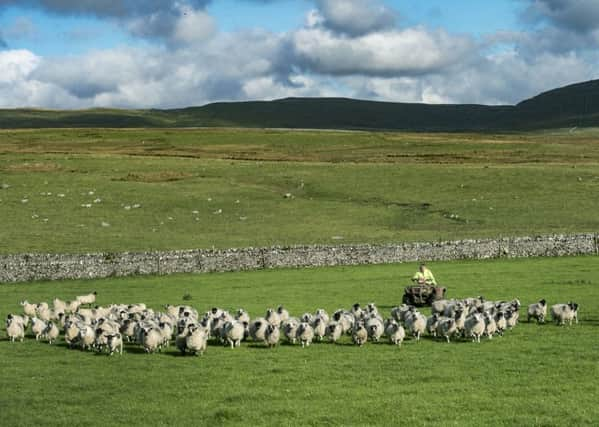YP Comment: Farmers pay the price again - scandal of missed subsidy targets


Yet what happens when 16 per cent of farmers do not receive their subsidies on time? There’s barely a murmur, even though the nation’s food producers have been left at the mercy of the Rural Payments Agency’s mismanagement for more than a decade now.
It should not be like this. Without this money, many farm businesses become financially unviable. Yet, according to a damning National Audit Office report, the RPA is so poorly run that it did not entirely fulfil its promise to prioritise those farmers worst-hit by last winter’s floods – it appeared to overlook the destruction to agricultural land in neighbouring Lancashire.
Advertisement
Hide AdAdvertisement
Hide AdEven the standard excuse by civil servants in such circumstances, namely these reports are historic and failings remedied, does not hold water because MPs were told earlier this month that 2016-17 payments planned for the beginning of December might not be paid until the end of the year as George Eustice, the Environment Minister, obfuscated this issue.
If other parts of Europe, notably Northern Ireland, can pay farmers on time and with a level of accuracy that appears beyond the RPA’s capabilities, why can’t this happen in England? This matters, as The Yorkshire Post’s editorial made clear as recently as October 15.
When Mr Eustice, a leading Brexiteer, gets his way and Britain leaves the EU in 2019 or thereabouts, the Government will have to devise a new system of subsidy payments from scratch – and the Minister needs to be more alert to this task and its importance. Those in receipt of other benefits would not tolerate such tardiness. Why should farmers?
The health police
EVEN though Theresa May’s government decided not to ban junk food advertisements from the nation’s television screens before 9pm each night, it has not stopped the World Medical Association from recommending even more stringent controls.
Advertisement
Hide AdAdvertisement
Hide AdIts global health leaders want promotions for fizzy drinks, burgers and so on banned from all programmes which are appealing to children. Does this mean pre-recorded shows have to be submitted to a special committee? What about soap operas where the storylines gravitate around pubs like The Woolpack in Emmerdale? What about top sporting events where a pitchside sponsor is a popular food or beverage brand? Are they banned?
The questions go on – how will the WMA monitor those social networks, video games and websites which youngsters access from their own mobile devices?
It should not be down to the so-called ‘nanny state’ to rule family lives in this way. It should be up to parents to accept responsibility for the upbringing of their children and not to succumb so liberally to ‘pester power’ when their offspring are looking for a bribe, or such like, in return for good behaviour.
Governments simply can’t micro-manage the upbringing of every child. Instead of hectoring, they should be looking to provide constructive guidance while coming up with creative campaigns to promote the benefits of a balanced diet and regular exercise. Rather than this draconianism, have the ‘health police’ even asked the producers of the omnipresent soaps to develop uplifting storylines around healthy living rather than the usual staple diet of death and human misery?
Train of thought
Advertisement
Hide AdAdvertisement
Hide AdTHIS region’s long-suffering rail travellers will be relieved that Northern is finally introducing refurbished trains this week as the bone-rattling Pacers are finally consigned to the antiquities siding at York’s National Railway Museum where their arrival is long-overdue. It’s not before time that the North receives the type of rolling stock long taken for granted in London and the South East.
Yet, while passengers can expect a more comfortable journey, it is still is taking too long for new carriages to come into operation to ease overcrowding. And then there’s the availability of free, uninterrupted wi-fi and 4G technology. Commonplace in France and other countries that truly value rail travel, all new trains should be fitted at the outset with the latest fibre-optics so time spent travelling to and from work, or business appointments, is not dead time because of poor internet connections. Unless new services keep up with the technology they, too, will become out-of-date very quickly.